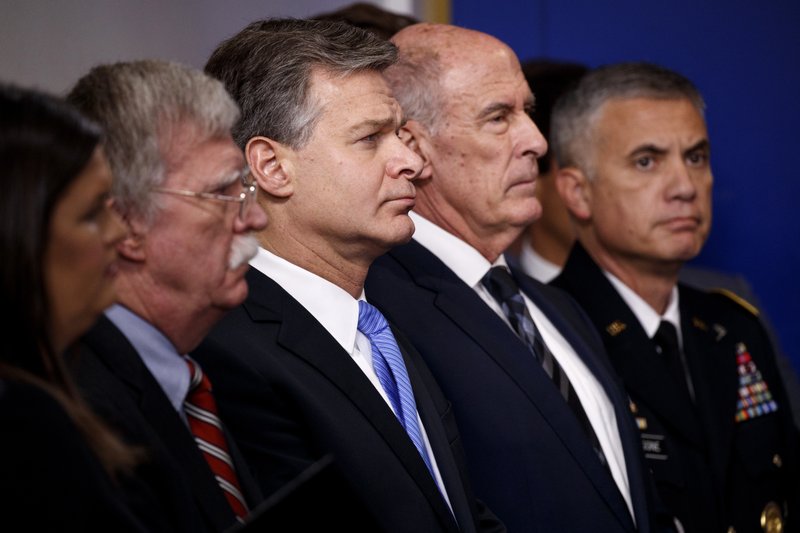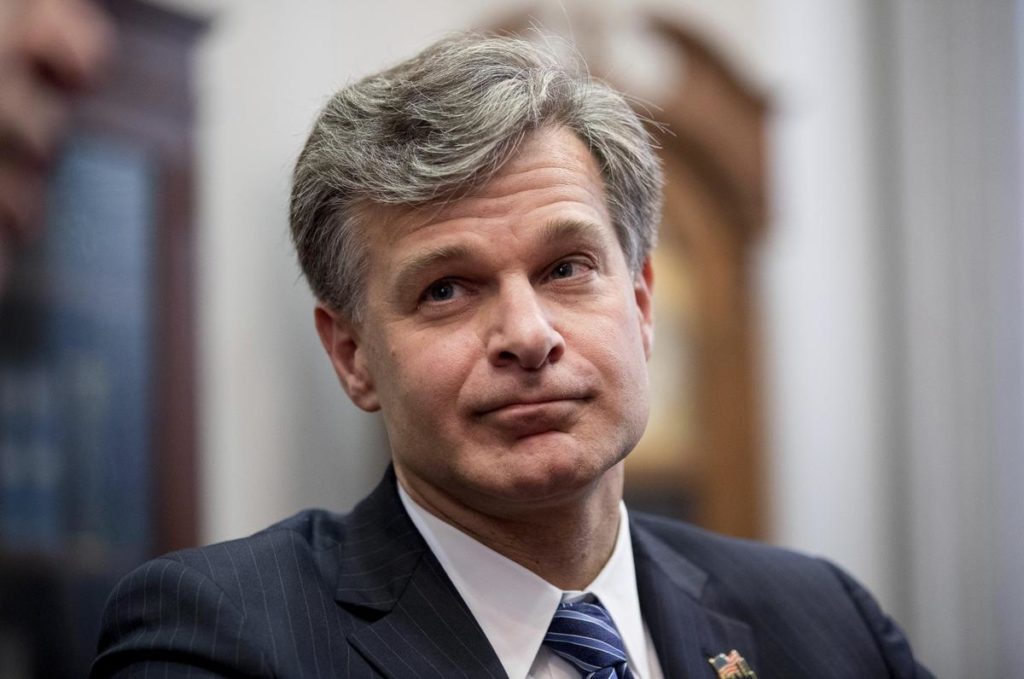Facebook and Twitter reveal sophistication of Russian trolls

The companies said they have removed dozens of fake accounts and pages from their services.
U.S. officials raise alarm about 2018, 2020 election security

President Donald Trump has directed a “vast, government-wide effort” to protect American elections after Russian attempts to interfere in 2016, the White House said Thursday. Responding to bipartisan criticism that it has no clear national strategy to protect the country during the upcoming midterms and beyond, John Bolton, the national security adviser, wrote in a letter to Senate Democrats that “President Trump has not and will not tolerate interference in America’s system of representative government.” The warning to American adversaries came as top U.S. intelligence and homeland security officials raised alarms about potential efforts to influence the 2018 and 2020 elections. Homeland security chief Kirstjen Nielsen said: “Our democracy is in the crosshairs.” “We continue to see a pervasive messaging campaign by Russia to try to weaken and divide the United States,” Director of National Intelligence Dan Coats said. Their comments during a White House briefing followed weeks after Trump publicly undermined the conclusions of American intelligence agencies regarding Russian interference. After suffering a bipartisan outcry, Trump later said he accepted those conclusions. They, along with National Security Agency director Gen. Paul Nakasone and FBI Director Christopher Wray, appeared at the White House Thursday to try to reassure the American people they are doing everything in their power to address the threat. “We’re throwing everything at it,” Coats said. Nielsen, Wray and Nakasone had all gathered earlier this week in New York City with leaders of top finance, energy and telecommunications companies for a cybersecurity summit, where they spoke of the urgent need for a collective, collaborative approach to security. At the event, Nielsen said the cyberthreat that now exceeds the danger of a physical attack against the U.S. by a hostile foreign group. Wray told reporters that compared to 2016, in 2018, “We are not yet seeing the same kind of efforts to specifically target election infrastructure,” but that other efforts to influence public opinion continue. He added that the FBI has active investigations on foreign influence across all 56 of its field office. “Make no mistake, the scope of this foreign influence threat is both broad and deep,” he said. But Nielsen said that U.S. agencies have “seen a willingness and a capability on the part of the Russians” to attack U.S. election infrastructure. On Capitol Hill, lawmakers in both parties have pushed election security toward the top of the coming fall agenda amid heightened concerns about interference by Russians and others ahead of the midterm elections. Asked this week how confident he was in the integrity of election systems ahead of the fall midterms, the No. 2 Republican, Sen. John Cornyn of Texas, said, “I’m confident we’re doing the best we can.” Beyond Russian interference with social media campaigns to influence voters, lawmakers are increasingly looking at how to bolster election infrastructure in the states — even though Congress shot down a recent effort to boost federal funding for local and state systems. Both Republicans and Democrats have criticized the administration’s response as fragmented, without enough coordination across federal agencies. And with the midterms only three months away, critics are calling on Trump to take a stronger stand on an issue critical to American democracy. Sen. Mark Warner of Virginia, the ranking Democrat on the Senate intelligence committee who has criticized Trump for not taking a stronger leadership role on election security, said he was heartened by the White House news conference. “Glad to see the White House finally do something about election security — even if it’s only a press conference,” Warner tweeted. “Now, if only it was actually backed up by anything the president has said or done on Russia.” The Senate is working on a bipartisan package backed by GOP leaders that would boost federal assistance to state and local election officials with cybersecurity guidelines, data sharing and security clearances. It’s expected in September. GOP lawmakers are wary of being seen as imposing any new regulations on states that have resisted federal control. Bolton said Trump is “leading unprecedented action to punish Russia” for its efforts to disrupt American elections. Republished with the permission of the Associated Press.
Low-key FBI director pick would lead agency through tumult

The attorney selected to replace James Comey as FBI director is described by those close to him as admirably low-key, yet he’d be taking over the law enforcement agency at a moment that’s anything but tranquil. Christopher Wray would inherit an FBI that lost its popular leader in an unceremonious firing in May and that has spent the last year investigating whether the Trump campaign coordinated with Russia to win the presidency. During this most consequential probe in decades, he’d be serving under a president who is said to have demanded loyalty from Comey and has appeared insensitive to the traditionally bright boundary between the White House and the FBI. Wray’s hearing Wednesday before the Senate Judiciary Committee may dive into his legal background but will almost certainly focus on the political maelstrom surrounding the nomination, with Democrats and perhaps some Republicans seeking assurances of his independence from President Donald Trump. Lawyers and FBI agents who have worked with Wray don’t expect that to be a problem, describing him as calm, methodical and even-handed. He has deep experience in Washington, serving as the top criminal lawyer in the Bush administration Justice Department and working closely not only with Comey but also Robert Mueller, the former FBI director who’s now serving as special counsel in charge of the Russia investigation. Wray’s confirmation would thrust him immediately into the ongoing Russia investigation, and though he’d likely receive updates on the probe’s progress and work to ensure that the special counsel has the resources he needs, prosecution decisions would be made by Mueller and his team. “The people in the bureau are particularly concerned about what’s going to walk through that door,” said Monique Roth, who worked under Wray in the criminal division. “He is a very steady hand at the helm.” Wray, 50, was selected following a weeks-long search that began days after Trump abruptly fired Comey. Several current and former elected officials were interviewed for the job, and many contenders gradually withdrew from consideration. The pick was revealed in a tweet that came as Washington was focused on consecutive days of significant congressional hearings involving top intelligence officials and then Comey. Wray was a top Justice Department official under Attorney General John Ashcroft and was nominated by President George W. Bush to head the criminal division between 2003 and 2005. In that position, besides overseeing major criminal prosecutions – such as the special task force investigating the Enron collapse – Wray also helped shape the U.S. government’s legal response to terrorism and national security threats. A specialized national security division was created after Wray’s departure. Though there’s not much in his background likely to trip him up at his hearing, Democrats will probably press him on his involvement in national security matters in the Bush administration, a period when the government authorized harsh interrogation techniques and routinely shipped to Guantanamo Bay terrorism suspects captured on foreign battlefields. Redacted emails to and from him are included in an ACLU database of memos on the interrogation and detention of terror suspects. But Barry Sabin, chief of the criminal division’s counterterrorism section at the time, said Wray made clear he did not support torture. Sabin pointed to the prosecution under Wray of a CIA contract worker in the beating an Afghan detainee who later died and said that after the Sept. 11 attacks, Wray recognized the need to balance national security concerns with civil liberties protections. “He has an exceptionally strong foundation to guide the bureau through threats and through challenges known and unknown,” Sabin said. Wray was at the department in 2004 when Comey, then the deputy attorney general, threatened to resign during a dispute with the White House over the reauthorization of a domestic surveillance program. Wray stopped Comey in the hallway one night amid resignation rumors with a particular request, according to the 2011 book, “The Threat Matrix.” “Look, I don’t know what’s going on, but before you guys all pull the rip cords, please give me a heads-up so I can jump with you,” Wray said. Wray has spent the last decade in private practice at King & Spalding in Atlanta, where he’s defended large corporations and financial institutions in criminal and civil cases. Most notably, he was personal lawyer to New Jersey Gov. Chris Christie in an investigation into the closing of the George Washington Bridge. Joe Robuck, a retired FBI agent who worked with Wray when he was a federal prosecutor in Atlanta, recalled him as a true partner whom he trusted enough to travel with on his interviews with witnesses, something not every prosecutor would do. They investigated a complicated securities fraud and public corruption case that had them and others working together around the clock. He was dedicated, and commanded the respect of agents, said Robuck, who expects Wray would have the same approach as FBI director. “He has a sense for his place in history,” said Roth, of the criminal division, noting that Wray seemed unconcerned that he was a Republican and she was not, even in his politically appointed position. FBI directors are appointed to 10-year terms meant to insulate them from political influence. And the bureau has been through transitions before, with successive leaders sporting different management styles. Louis Freeh, an ex-agent himself, was known to jog with Quantico academy recruits. He was replaced by Mueller, who took over days before the Sept. 11 attacks and shepherded the bureau through a tense decade of national security threats with a demanding, competent management style. Comey was exceedingly well-liked by subordinates for his approachable leadership, and his abrupt dismissal – and shifting explanations from the White House, and public denigration of their work – angered career agents. “At the end of the day, they’ve got a job to do – that’s to protect the national security of the country,” said retired FBI official Andrew Arena. “They’ll get over it quickly. Jim Comey would want them to.” Arena said the fact that Wray’s “not an


